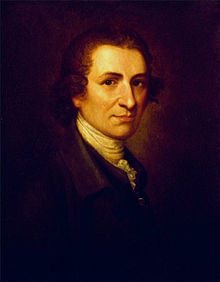Human rights
The Rights of Man (original title: The Rights of Man ) is a pamphlet by Thomas Paine , published in two parts in 1791 and 1792 , in which he opposed the French version represented by Edmund Burke in his book Reflections on the Revolution in France in 1790 Revolutionary views taking a stand.
The first part appeared in February 1791. In February 1792 the second part followed. The work defended the French Revolution and summarized the results of the political enlightenment of the 18th century . Due to the generally understandable writing style, the script was received not only by British and French nobles, philosophers and non-conformist clergy, but also by a broad public. In England, Paine became hostile to Pitt through the writing , which is why he was accused and convicted in absentia of Seditious libel (for example: "subversive abuse"). However, he was supported by the Whig Party.
German publication
The first German translation of the first part appeared as early as 1791. The translator was Meta Forkel-Liebeskind , one of the Göttingen “ Universitätsmamsellen ”, who wrote to the hesitant publisher Christian Friedrich Voss , who was concerned about the political censorship in Prussia :
- So straight to the point: You rejected Paine, and the good Forster announced this to me with a sad face, as if he were speaking a death sentence [...] But on the side, I was not saddened by your refusal because I am firmly convinced that you would Seeing the book, all you can do is print it, even if it was treason.
Voss had raised objections to the quality of the translation in order not to have to print the work, which the translator recognized and disgusted:
- The translation itself is how I flatter myself and HR. Forster flatters me not to find any trace of haste, because in the case of a piece that is to be regarded as a document of humanity, I have made it my duty to weigh every expression carefully.
The aforementioned “HR. Forster ”was Georg Forster , later an exponent of the Mainz Republic , who then also wrote a preface to Paine's work.
Voss no longer published the second part, but ceded the work to Proft in Copenhagen, where the second part appeared in 1793, along with a collection of Paines' political writings as a third part.
expenditure
- The Rights of Man, Being An answer to Mr. Burke's Attack on the French Revolution. 2 parts. London 1791 u. 1792.
- Human rights. First German translation by Meta Forkel-Liebeskind . Vossische Buchhandlung, Berlin 1792 digitized .
- Human rights. A response to Mr. Burke's attack on the French Revolution. 3 parts. Proft, Copenhagen 1793.
- New edition: Human rights in the contemporary broadcast by DM Forkel. Edited and introduced by Theo Stemmler. Suhrkamp, Frankfurt a. M. 1973, ISBN 3-518-06375-8 .
- Human rights. Ed., Translated and introduced by Wolfgang Mönke . 2., through u. with e. Nachw. Provided edition. Akademie-Verlag, Berlin 1983.
Web links
- Human rights (PDF; 910 kB) - German translation by Friedrich Hecker
Individual evidence
- ^ Letter of November 21, 1991, Forster's works. Sixteenth Volume (I, 31), p. 563.
- ↑ Eckart Kleßmann : Universitätsmamsellen: five enlightened women between Rococo, Revolution and Romanticism. The Other Library Vol. 281. Eichborn, Frankfurt am Main 2008, ISBN 978-3-8218-4588-3 , pp. 177f
- ↑ Monika Siegel: "I had a penchant for enthusiasm ..." Dissertation, TU Darmstadt 2001, p. 101f

